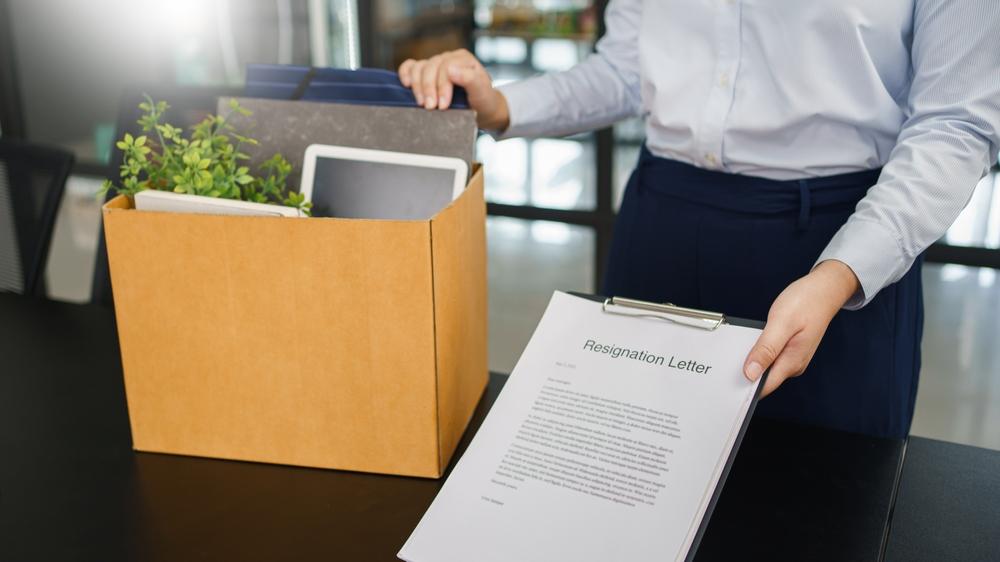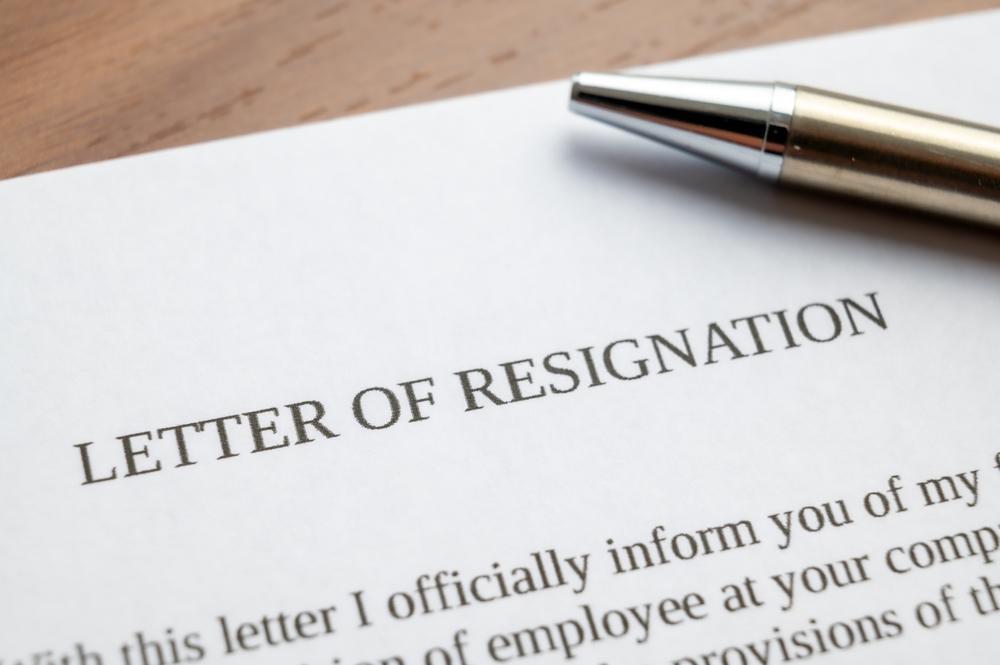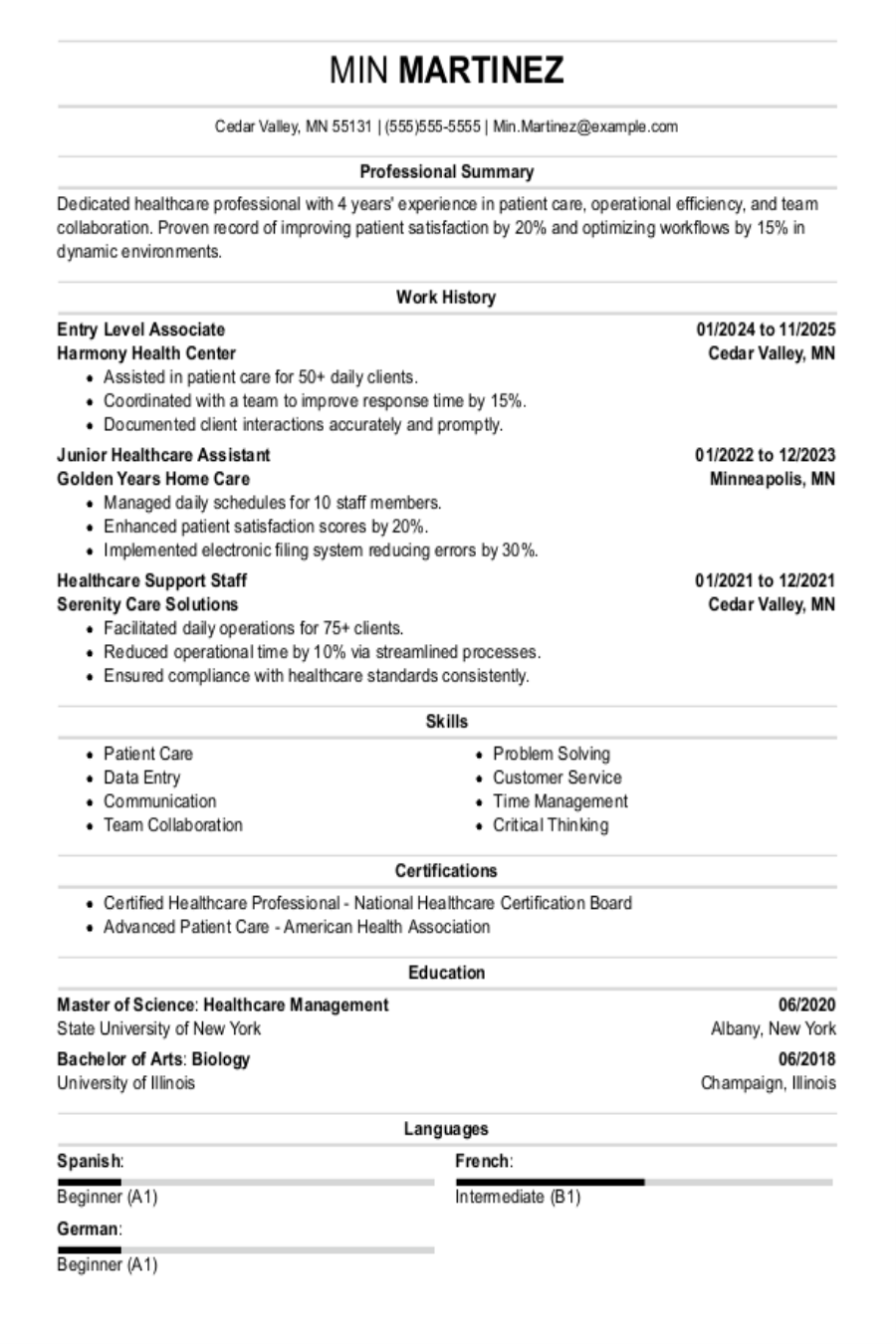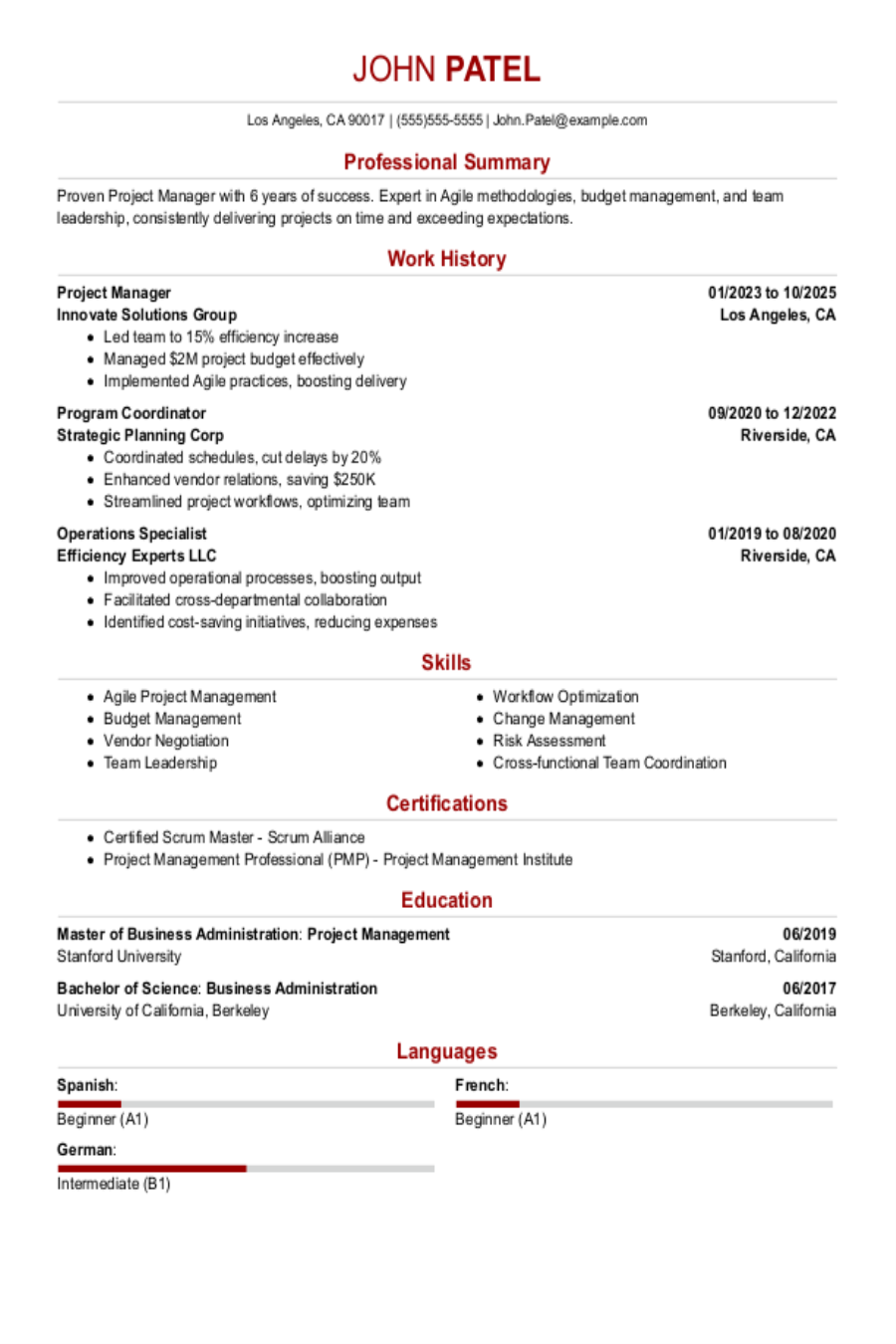When it's time to leave a job, whether for a new opportunity or personal reasons, it's essential to exit professionally. A resignation letter is a formal way to notify your employer of your decision to leave, offering both courtesy and clarity. While the conversation with your manager may be brief, a well-written resignation letter helps solidify a positive final impression.
In this guide you'll learn:
- What a letter of resignation is and why it is important.
- How to write a resignation letter.
- Examples of resignation letters for different scenarios.
- When to submit a letter of resignation.
Are You Still Applying to New Jobs? If you're thinking about leaving your current job without having secured a new one, we can help you land your next role with our AI Resume Builder. Fast and easy, either upload your current resume or make a new one in just a few clicks thanks to our generated content suggestions and templates!
What Is a Resignation Letter?
A resignation letter is a formal document that communicates your intention to leave your current position.
It typically includes:
- Your last working day.
- A brief reason for your resignation (optional).
- An offer to help with the transition (if applicable).
Due to its straightforward nature, a letter of resignation has a very simple format. Typically written as an email, it does not take much to provide valuable information for your employer's human resources department.
Why Is a Resignation Letter Important?
There are several reasons why submitting a resignation letter at your job is essential for a smooth transition:
- Shows Professionalism: A written resignation signals that you're handling your departure responsibly and respectfully. This allows you to leave on good terms and potentially use your employer as a future reference.
- Prevents Misunderstandings: By clearly stating your intent and timeline, you reduce the chance of confusion or miscommunication. Your letter of resignation tells your employer exactly how much time they have to prepare for your departure.
- Creates a Formal Record: HR departments often require written notice to document your final workday, manage benefits and process final pay. This also helps prevent misunderstandings because your resignation letter is official reference material.
Regardless of how much notice you give your employer, a formal resignation letter ensures that your departure is handled efficiently and respectfully.

How to Write a Resignation Letter
Knowing how to write a resignation letter is important, and luckily, it doesn't take much! Your letter of resignation does not have to be very long; however, you must hit all the key points. Here are the steps to follow to successfully communicate your exit:
Step 1
Subject Line
When writing your resignation letter, start with a clear and professional subject line, especially if you're submitting it via email. A concise subject line helps the recipient immediately understand your intent.
Examples of appropriate subject lines include:
- Resignation – [Your Name]
- Notice of Resignation – [Your Name]
- Formal Resignation – [Your Name]
Your subject line should always include the word "resignation" and your full name to avoid any confusion and clearly communicate the purpose of your message.
Step 2
Start With a Professional Greeting
Begin your letter with a formal greeting. Address your supervisor or manager by name, using one of the following salutations:
- Dear [Manager's Name],
- Dear Mr./Ms. [Last Name],
Make sure to use the correct title and spelling of their name for added professionalism.
Step 3
State Your Intent to Resign
In the first paragraph, get straight to the point by clearly stating your intention to resign. Keep this sentence simple and direct:
- "I am writing to formally resign from my position as [Your Job Title] at [Company Name], effective [Resignation Date]."
This direct approach leaves no room for confusion and ensures that your message is understood right away.
Step 4
Include Your Last Day of Work
Next, specify the exact date of your last working day. If you're giving two weeks' notice, mention that as well:
- "My last day of work will be [Date], two weeks from today."
- "I will be available until [Date], at which point my resignation will take effect."
Providing a clear time frame allows your employer to plan for your departure.
How Much Notice Should You Give?
The professional standard of a resignation letter is to provide at least two weeks' notice before your intended last day of work.
This gives your employer enough time to start the transition process and look for a replacement. In some industries, longer notice periods such as one month may be more appropriate, especially for senior roles.
However, this is not always possible and even giving very little notice is still helpful for your employer. It is, after all, much better than just not showing up to work one day and causing a lot of unnecessary confusion!
Step 5
Express Gratitude
Now that you have provided your intent to leave and timeline, take a moment to thank your employer for the opportunities you've had in the role.
This simple act of courtesy can help leave a positive impression and maintain professional relationships.
For example, you could say something like:
- "I would like to express my gratitude for the opportunity to work at [company name] and for the support and guidance I've received during my time here."
- "I have greatly appreciated the experience and opportunities this role has provided."
Showing appreciation reinforces goodwill, regardless of the circumstances of your departure.
If you want to convey sincere appreciation, add a specific memory or two that clearly shows the positive relationship you had with your employer.
Step 6
Offer Assistance in the Transition
There's a good chance that your resignation will require a new or current employee to handle your responsibilities.
If possible, offer to help with the transition to ensure a smooth handover, such as:
- "I am happy to assist in the transition process, including training my replacement or completing any outstanding projects."
- "If there is anything that I can do to help with this transition, please let me know."
Helping out can be a good use of your remaining time at the company, especially to pass on any important knowledge related to your position.
Even if your offer isn't needed, this gesture demonstrates your professionalism and willingness to help the company, especially if they align with your work values.
Step 7
Close the Letter Professionally
End your resignation letter with a respectful closing statement.
Some common examples include:
- "Thank you once again for the opportunity. I wish you and the team continued success."
- "Thank you for your understanding. I look forward to staying in touch."
After that, sign off with a professional closing, such as:
- Sincerely,
- Best regards,
- Best wishes,
Include your full name beneath the closing.

Resignation Letter Examples
As you can see, a resignation letter is short and sweet. That being said, there are all types of situations in which you might write one.
Below are several examples of resignation letters for common scenarios. Each sample can be used as a template to help you craft your own letter, depending on your circumstances.
1. Standard Resignation Letter
This simple resignation letter is a great template that is ideal for most situations.
Dear [Manager's Name],
I am writing to formally resign from my position as [Your Job Title] at [Company Name], effective [Resignation Date].
I am grateful for the opportunity to have been part of [Company Name] and have appreciated the support and collaboration of the team. I've enjoyed my time working here and have learned a great deal.
Please let me know if I can assist during the transition process. I wish the company continued success and hope our paths cross again in the future.
Sincerely,
[Your Full Name]
2. Resignation Letter With Two Weeks' Notice
Although not required, for most circumstances, a two week' notice is considered a respectful amount of time to give to your employer, because it gives them ample time to make arrangements for your departure.
This letter of resignation template shows how you can provide a formal two week' notice:
Subject: Notice of Resignation – [Your Name]
Dear [Manager's Name],
Please accept this letter as formal notice of my resignation from my role as [Your Job Title] at [Company Name], effective [Resignation Date], which will be two weeks from today.
I appreciate the opportunities I have been given during my time here and am thankful for the experience I have gained. I will do my best to ensure a smooth transition and am happy to assist in training my replacement if needed.
Thank you once again for the support and encouragement. I look forward to staying in touch and wish [Company Name] continued success.
Sincerely,
[Your Full Name]
3. Resignation Letter Effective Immediately
Sometimes, you can't provide two weeks or any amount of time and you need to write a resignation letter effective immediately.
For these situations, this sample shows how to keep the tone professional, even when not providing notice.
Subject: Immediate Resignation – [Your Name]
Dear [Manager's Name],
I regret to inform you that, due to unforeseen circumstances, I must resign from my position as [Your Job Title] at [Company Name], effective immediately.
I understand the inconvenience this may cause and will do everything I can to assist with the transition process in the coming days. I deeply appreciate the opportunity to work at [Company Name] and will always value my time here.
Thank you for your understanding.
Sincerely,
[Your Full Name]
4. Resignation Letter Due to Personal Reasons
If personal reasons are causing your departure and you wish to share this with your employer, this resignation letter template balances clarity and professionalism while keeping details private.
Subject: Resignation – [Your Name]
Dear [Manager's Name],
I am writing to formally resign from my position as [Your Job Title] at [Company Name], effective [Resignation Date].
This decision has been a difficult one, but due to personal reasons, I must step down from my role. I am grateful for the support and opportunities I've received during my time here and will assist with the transition to ensure a smooth handover of my responsibilities.
Thank you for your understanding and support during this time. I wish the company continued success.
Sincerely,
[Your Full Name]
Employee Resignation Letter Examples by Job
Here are some examples of resignation letters tailored to specific job roles. These provide industry-specific phrasing and can be a great template when writing your own resignation letter by personalizing it toward your career.
1. Teacher Resignation Letter
As a teacher, you may want to write your resignation letter along these lines:
Subject: Resignation – [Your Name]
Dear Principal [Last Name],
I am writing to formally resign from my position as [Your Subject] teacher at [School Name], effective [Resignation Date]. After much consideration, I have decided to pursue new opportunities.
I deeply appreciate the chance to work with the dedicated staff and wonderful students at [School Name]. It has been a rewarding experience and I am grateful for the support and opportunities for growth that I've received during my time here.
Please let me know how I can assist with the transition process to ensure a smooth handover for the new teacher.
Sincerely,
[Your Full Name]
2. Nurse Resignation Letter
Your position as a nurse may make you consider drafting your resignation letter with this approach in mind:
Subject: Resignation – [Your Name]
Dear [Manager's Name],
Please accept this letter as formal notice of my resignation from my position as registered nurse at [Hospital Name], effective [Resignation Date].
I have truly enjoyed working at [Hospital Name] and am grateful for the experience I've gained in patient care and the camaraderie of my colleagues. However, I've decided to pursue another opportunity that aligns with my career goals.
Thank you for the opportunity to serve as part of your team. I am willing to assist with the transition to ensure a smooth process for both staff and patients.
Sincerely,
[Your Full Name]
3. Software Engineer Resignation Letter
When resigning from your position as a software engineer, you could frame your letter in a similar way to this example:
Subject: Resignation – [Your Name]
Dear [Manager's Name],
I am writing to formally resign from my position as software engineer at [Company Name], effective [Resignation Date].
Working at [Company Name] has been a great learning experience and I'm grateful for the support and collaboration of the engineering team. After careful consideration, I've decided to pursue a new role that aligns more closely with my personal and professional goals.
I will do everything I can to help during the transition, including assisting with any ongoing projects and ensuring a smooth handover of my responsibilities.
Thank you once again for the opportunity and I look forward to staying in touch.
Sincerely,
[Your Full Name]
4. Retail Manager Resignation Letter
If you're a retail manager, your resignation letter could be structured like the one below:
Subject: Resignation – [Your Name]
Dear [Manager's Name],
Please accept this letter as my formal resignation from my position as retail manager at [Store Name], effective [Resignation Date]. After much reflection, I have decided to pursue a new career path.
I want to express my gratitude for the support and leadership opportunities I've received during my time at [Store Name]. Managing such a dedicated team has been a fulfilling experience and I've learned a great deal that will serve me in my future endeavors.
I am happy to assist with training my replacement or any other transitional tasks.
Thank you once again for the opportunity.
Sincerely,
[Your Full Name]
5. Sales Representative Resignation Letter
As a sales representative, you may wish to compose your resignation letter using a format like this:
Subject: Resignation – [Your Name]
Dear [Manager's Name],
I am writing to inform you of my resignation from my position as sales representative at [Company Name], effective [Resignation Date].
I've enjoyed being part of the sales team at [Company Name] and appreciate the professional development and growth I've experienced here. After considering my career goals, I've decided to explore a new opportunity in a different industry.
I am available to assist with any transitional tasks or to help train my replacement in the coming weeks.
Thank you for your understanding and I wish [Company Name] continued success.
Sincerely,
[Your Full Name]
Common Mistakes to Avoid
Writing a resignation letter may seem straightforward, but there are common mistakes that can impact the professionalism of your departure. Avoiding these pitfalls ensures that you leave your role on good terms:
- Being Overly Negative: It's important to maintain a positive and professional tone. Avoid criticizing your employer, colleagues or the company, even if you're leaving due to dissatisfaction. A resignation letter is not the place for airing grievances.
- Providing Too Much Detail: Keep your letter concise. While it may be tempting to explain why you're leaving, a resignation letter should be focused on the facts — your intent to resign, your last working day and an offer to assist with the transition. Detailed explanations of personal reasons or frustrations aren't necessary.
- Being Unprofessional: Resignation letters should be formal, respectful and free from casual language or humor. Treat your resignation letter as a professional document, regardless of your relationship with your manager or the company.
- Not Offering to Help With the Transition: Failing to offer assistance during your transition can leave a negative impression. Even if your help isn't needed, it shows good will and professionalism to offer support in wrapping up projects or training your replacement.
- Failing to Proofread: Spelling and grammatical errors can detract from the professionalism of your letter. Always proofread your resignation letter before submitting it to avoid simple mistakes.
Key Takeaways
Maintain Professionalism
A resignation letter should be formal, polite and respectful. Keep your tone positive and focused on your departure, not on any frustrations or grievances.
State the Facts Clearly
Your resignation letter should include key information such as your intent to resign, your last day of work and an offer to assist with the transition. Avoid providing too much personal detail.
Express Gratitude
Thank your employer for the opportunities and experiences you've had during your time with the company. This reinforces goodwill and helps preserve professional relationships.
Offer Assistance During the Transition
If possible, offer to help during the transition period. Whether it's training a replacement or wrapping up projects, this shows that you're leaving on a positive and responsible note.
Avoid Common Pitfalls
Ensure your resignation letter is free from negativity, excessive details and errors. Always proofread your letter to maintain a professional image.
FAQ
Here are some frequently asked questions about writing a resignation letter to help guide you through the process.
No, it's not necessary to provide a detailed reason for your resignation in your letter. If you wish to, you can keep it brief by mentioning personal reasons or a new opportunity, but this is entirely optional.
The standard practice is to give at least two weeks' notice. However, depending on your role and company policy, you may need to give more notice. Senior positions or roles with specialized knowledge may require more time to ensure a smooth transition.
Yes, it's acceptable to send your resignation letter via email, especially if you work remotely or cannot submit it in person. Be sure to use a professional tone and consider attaching the resignation letter as a PDF for formality.
While it's best to give two weeks' notice, there are situations where it may not be possible (e.g., personal emergencies or immediate new job requirements). In these cases, explain your situation respectfully in your resignation letter and offer assistance during the transition if possible.
Yes. Offering to help with the transition, such as training your replacement or wrapping up ongoing projects, is a professional gesture. Even if your help isn't required, it demonstrates that you're leaving on good terms and shows your commitment to a smooth departure.
Yes, using a resignation letter template is a great way to ensure your letter follows the proper structure and tone. Be sure to personalize it with your details, such as your job title, last working day and any expressions of gratitude.
In most cases, once you've submitted your resignation, it's final. However, if circumstances change and you wish to stay, speak to your employer as soon as possible. They may consider retracting your resignation depending on the situation, but this is not guaranteed.
Conor is a Certified Professional Resume Writer (CPRW) and member of the Professional Association of Resume Writers & Career Coaches dedicated to helping job seekers excel in their careers.
More resources

Bad Cover Letter Examples: How To Fix Those Annoying Mistakes
Check out four sample cover letters and then learn from a pro...
![Communication Skills for Your Resume [40+ Examples and How to Improve Them] Communication Skills for Your Resume [40+ Examples and How to Improve Them]](/sapp/uploads/2025/08/Communication-skills.png)
Communication Skills for Your Resume [40+ Examples and How to Improve Them]
Good communication skills can propel your personal and profess...

How to List Language Skill Levels on Your Resume
Language skills give you an instant advantage in the job marke...

Entry-level Resume: Examples, Templates & Tips
Conor McMahon CPRWCareer Writer Conor is a Certified Professi...

Construction Project Manager Resume Examples & Guide
Conor McMahon CPRWCareer Writer Conor is a Certified Professi...

Engineering Project Manager Resume Examples & Guide
Conor McMahon CPRWCareer Writer Conor is a Certified Professi...
